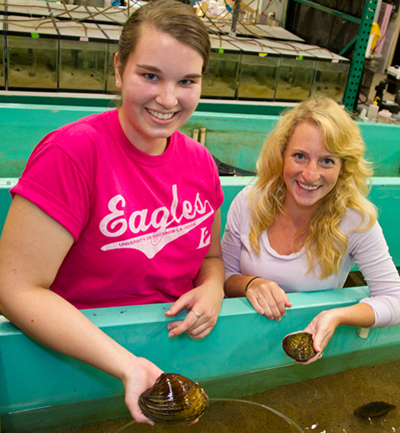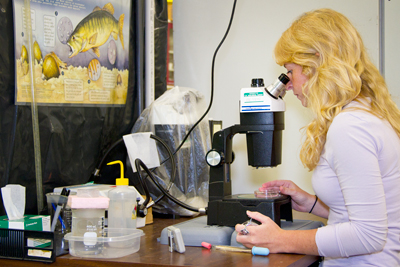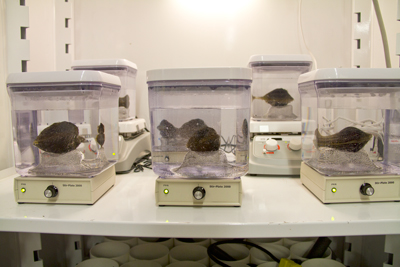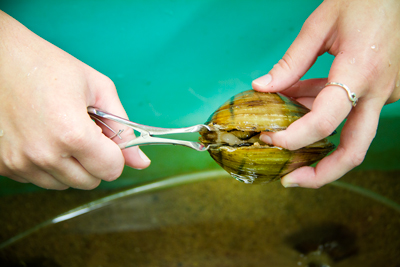Posted 3:14 p.m. Friday, July 29, 2011

Student researchers say freshwater mussels, important to the health of the Mississippi River, could be threatened by rising temperatures.
 [/caption]
They look like lifeless rocks, nestled in the sand of the Upper Mississippi River. But freshwater mussles, commonly referred to as clams, are important to the health of the river and could be threatened by rising temperatures in these waters, say UW-L student researchers.
“Before I thought of them as something you tripped over in the river,” explains Alissa Ganser, a UW-L graduate student in biology. “Now I think of them as these fascinating organisms desperately needing our protection.”
Nearly 70 percent of the 300 species of freshwater mussels in North America are in jeopardy of becoming extinct. New research UW-L students are conducting suggests that rising temperatures in the Upper Mississippi River may be a further threat to this endangered organism.
[caption id="attachment_4631" align="alignright" width="400" caption="Patty Ries, UW-L undergraduate student in biology, counts the heart beats of a juvenile mussel. The mussel is less than a millimeter in size."]
[/caption]
They look like lifeless rocks, nestled in the sand of the Upper Mississippi River. But freshwater mussles, commonly referred to as clams, are important to the health of the river and could be threatened by rising temperatures in these waters, say UW-L student researchers.
“Before I thought of them as something you tripped over in the river,” explains Alissa Ganser, a UW-L graduate student in biology. “Now I think of them as these fascinating organisms desperately needing our protection.”
Nearly 70 percent of the 300 species of freshwater mussels in North America are in jeopardy of becoming extinct. New research UW-L students are conducting suggests that rising temperatures in the Upper Mississippi River may be a further threat to this endangered organism.
[caption id="attachment_4631" align="alignright" width="400" caption="Patty Ries, UW-L undergraduate student in biology, counts the heart beats of a juvenile mussel. The mussel is less than a millimeter in size."] [/caption]
In a collaborative research project between the U.S. Geological Survey and UW-La Crosse, Ganser and two other UW-L student researchers measure what happens to mussels’ heart rates after exposing them to elevated water temperatures. One study found 80 percent of pregnant female mussels died at temperatures of 86 degrees F and above. Those temperatures have been recorded in shallow places of the Mississippi, says Ganser. Now student researchers are moving on to study juveniles and non-pregnant adults.
“Climate change is another threat to these already endangered animals, and recent research has shown that some freshwater mussels are already living close to their thermal limits,” says USGS scientist Teresa Newton.
This is bad news for Ganser who has developed a strong affinity for mussels. As[caption id="attachment_4638" align="alignright" width="400" caption="Students put mussels in these tanks filled with water of various temperatures. Then they monitor the mussels to see how they adapt to the rising temperature."]
[/caption]
In a collaborative research project between the U.S. Geological Survey and UW-La Crosse, Ganser and two other UW-L student researchers measure what happens to mussels’ heart rates after exposing them to elevated water temperatures. One study found 80 percent of pregnant female mussels died at temperatures of 86 degrees F and above. Those temperatures have been recorded in shallow places of the Mississippi, says Ganser. Now student researchers are moving on to study juveniles and non-pregnant adults.
“Climate change is another threat to these already endangered animals, and recent research has shown that some freshwater mussels are already living close to their thermal limits,” says USGS scientist Teresa Newton.
This is bad news for Ganser who has developed a strong affinity for mussels. As[caption id="attachment_4638" align="alignright" width="400" caption="Students put mussels in these tanks filled with water of various temperatures. Then they monitor the mussels to see how they adapt to the rising temperature."] [/caption]
she picks up each species from a sand-filled tank in the lab, she smirks at their common names such as “Pimpleback,” Pocketbook” and “Threehorn wartyback” — names all derived from their shells’ odd shapes and textures. But Ganser notes others likely don’t care as much about mussels.
“No one sees them,” she says. “They don’t have eyes or cute, little faces.”
Be that as it may, Ganser says mussels do a lot that people don’t know about or appreciate. For one, they act like mini wastewater treatment plants, cleaning river water free of charge. They also secrete nutrients into the water to support aquatic ecosystems, and their shells are used to make pearls for jewelry.
“It’s amazing what just this one animal can provide,” she notes.
[caption id="attachment_4649" align="alignright" width="400" caption="A student gently opens the mussel to check if it is still pregnant after running a test."]
[/caption]
she picks up each species from a sand-filled tank in the lab, she smirks at their common names such as “Pimpleback,” Pocketbook” and “Threehorn wartyback” — names all derived from their shells’ odd shapes and textures. But Ganser notes others likely don’t care as much about mussels.
“No one sees them,” she says. “They don’t have eyes or cute, little faces.”
Be that as it may, Ganser says mussels do a lot that people don’t know about or appreciate. For one, they act like mini wastewater treatment plants, cleaning river water free of charge. They also secrete nutrients into the water to support aquatic ecosystems, and their shells are used to make pearls for jewelry.
“It’s amazing what just this one animal can provide,” she notes.
[caption id="attachment_4649" align="alignright" width="400" caption="A student gently opens the mussel to check if it is still pregnant after running a test."] [/caption]
Ganser ultimately hopes to add more data to what is known about freshwater mussels, particularly the varying thermal tolerances of certain species.
“With this data we can provide information to resource managers so they can plan ahead and hopefully work on preventing any negative effects of climate change on these freshwater mussels,” she explains.
Ganser said a UW-L professor helped her connect to this opportunity at USGS after finishing her undergraduate degree in biology at UW-L. She’s elated about the opportunity.
“When I started I didn’t know a lot about mussels,” she says. “Now I love them.”
Ganser received support for this research from the UW-L River Studies Center and the office of Graduate Studies via a graduate research grant.
The River Studies Center (RSC), created in 1972, is a non-curricular arm of the university focusing on research and informational programs pertinent to the Upper Mississippi River and its related resources.
[/caption]
Ganser ultimately hopes to add more data to what is known about freshwater mussels, particularly the varying thermal tolerances of certain species.
“With this data we can provide information to resource managers so they can plan ahead and hopefully work on preventing any negative effects of climate change on these freshwater mussels,” she explains.
Ganser said a UW-L professor helped her connect to this opportunity at USGS after finishing her undergraduate degree in biology at UW-L. She’s elated about the opportunity.
“When I started I didn’t know a lot about mussels,” she says. “Now I love them.”
Ganser received support for this research from the UW-L River Studies Center and the office of Graduate Studies via a graduate research grant.
The River Studies Center (RSC), created in 1972, is a non-curricular arm of the university focusing on research and informational programs pertinent to the Upper Mississippi River and its related resources.